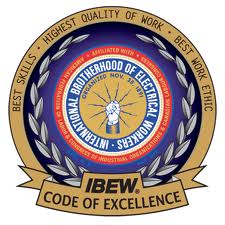Pres Cooper : The Great Betrayal(EW)
IBEW President Cooper addresses critical challenges facing electrical workers and the union's commitment to protecting member interests against industry pressures. Source: ibew.org
IBEW President Cooper addresses critical challenges facing electrical workers and the union's commitment to protecting member interests against industry pressures. Source: ibew.org
IBEW explores strategic partnerships in the renewable energy sector, focusing on securing union jobs in solar projects while addressing industry challenges and competition. Source: ibew.org
Secretary-Treasurer Noble discusses workplace mental health challenges and hidden injuries affecting electrical workers, emphasizing the union's commitment to comprehensive member wellness. Source: ibew.org
IBEW announces new training initiatives designed to prepare members for emerging opportunities in advanced manufacturing, ensuring the union stays competitive in evolving industrial sectors. Source: ibew.org
Reader correspondence highlighting positive outcomes and achievements within the IBEW community, showcasing member experiences and union impact stories. Source: ibew.org
China is dramatically outpacing the United States in clean energy development, with more wind turbines and solar panels installed last year than in the rest of the world combined. China's clean energy boom is going global, with Chinese companies building electric vehicle and battery factories across multiple continents. This development has significant implications for IBEW members as it shapes the global energy landscape and affects domestic energy infrastructure projects and employment opportunities in the electrical sector. Source: nytimes.com
Washington state leaders have criticized the Republican-led repeal of clean energy tax credits, warning that these cuts could threaten the AI boom and increase energy costs. The roundtable discussion highlighted concerns about how eliminating clean energy incentives could impact data center development and artificial intelligence infrastructure projects. For IBEW members, this represents potential changes in both renewable energy construction jobs and the growing data center electrical work sector. Source: geekwire.com
The Environmental Protection Agency is planning to rescind its endangerment finding on greenhouse gas emissions, which could fundamentally change federal climate and energy regulations. This policy shift would eliminate many environmental restrictions on power plants and industrial facilities, potentially affecting the types of electrical infrastructure projects that IBEW members work on. The change could impact both renewable energy development and traditional power generation sector employment opportunities. Source: insideclimatenews.org
Extreme heat events are placing unprecedented stress on electrical power grids, creating both challenges and opportunities for the electrical workforce. Heatwaves increase electricity demand for cooling while simultaneously reducing transmission efficiency and stressing equipment. For IBEW members, this trend represents growing demand for grid maintenance, infrastructure upgrades, and emergency repair work as utilities work to maintain reliable service during extreme weather events. Source: sustainabilitymag.com
An analysis examining whether renewable energy sources have actually reduced electricity prices for consumers, with implications for energy policy and market dynamics. The study explores the complex relationship between renewable energy deployment and electricity costs, considering factors like grid integration costs and market structures. For IBEW members, understanding these price dynamics is crucial as they affect both employment opportunities in different energy sectors and the long-term viability of various electrical infrastructure projects. Source: theclimatebrink.com
